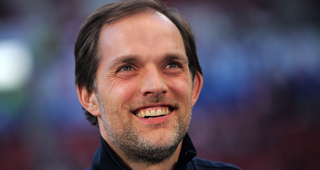Borussia Dortmund started the day in third place in the Bundesliga table, with Bayer Leverkusen in tenth, when the two sides met last October. The match pitted Thomas Tuchel and Roger Schmidt, two of the most interesting and diametrically opposed tacticians in the Bundesliga, head to head. Tuchel carried the torch set by Pep Guardiola’s positional play, passing style with young players. Schmidt was dogmatic about pressing in a 4-2-2-2 formation. The result would be an early indicator into whether Dortmund could challenge Bayern Munich for the domestic title. Just nine months later, as we prepare for another Bundesliga season, neither manager are with their club.
Leverkusen won the match 2-0 with goals from Admir Mehmedi and Chicharito. One could say that Dortmund and Tuchel lost the match with their initial approach. Eschewing his usual 4-3-3 formation with Julian Weigel as the deep lying playmaker, Tuchel changed to three centerbacks in an effort to outnumber Leverkusen’s two striker press at the back. The flatness of the back three backfired, enabling Leverkusen’s two strikers to easily defend passing lanes and disrupt the initial buildup phase. Acknowledging his initial mistake, Tuchel reverted back to a four defender backline after Mehmedi’s goal in the 10th minute. But the rhythm had already been established. The Dortmund manager could only complain about the physicality of Schmidt’s side afterwards.
Dortmund dropped to third in the table after the disappointment. They would go no higher the rest of the season, stuck in a second tier purgatory under Bayern Munich, alongside RB Leipzig and Hoffenheim. With Bayern dropping points the same weekend, the loss was a failed opportunity to challenge for the title as well as a blueprint for physical sides to beat Tuchel’s side. They still had the most exciting collection of young talent in the world this side of Real Madrid, featuring Weigl, Christian Pulisic, and Ousmane Dembele in attack. It was easy to get carried away in imagining how Tuchel would develop the group in upcoming seasons.
But that small, pesky variable of off-field personality clashes sunk the vision. The transfer window underlied the mistrust between Tuchel and Dortmund CEO Hans-Joachim Watzke, an oft-criticized figure in German football. Tuchel lost his team spine in Mats Hummels, Henrikh Mkhitaryan, and Ilkay Gundogan last summer. He fell out with chief scout Sven Mislintat. Tuchel had never seen winter signing Aleksander Isak play. Mario Goetze admitted that playing under Tuchel was difficult. He was accused of never identifying with the club in the first place. And this was before the quick rescheduling after the bombing of their team bus in a Champions League quarterfinals loss against Monaco. Tuchel said his team felt hopeless and unable to process the trauma of the events from the day before.
Tuchel was fired days after winning the German Cup, the club’s first trophy since 2012. The emphasis on possession figures to continue under new manager Peter Bosz, albeit simpler. Mahmoud Dahoud adds to the attacking spine of Dembele, Pulisic, and Pierre-Emerick Aubameyang (for now). It is a testament to the speed of each season that Dortmund head into the season overlooked. What was carefully planned on the field for two seasons can be destroyed exponentially quicker. Regardless of how brilliant a tactician the 43-year-old Tuchel, or any manager, proves to be, the relationship between manager and club comes down to the basic values of trust and respect.
-----
The two clubs met again six months later, with Dortmund winning 6-2 this time. Schmidt was fired the following week after a run of seven losses in thirteen matches. As Andy Brassell noted, his Leverkusen’s sides were defined by stretches of highs and lows, with little else in between. Perhaps no team relied on energy as a skill more than Leverkusen.
That initial 2-0 win over Dortmund took Leverkusen from tenth to sixth place, their highest position for the entire season. The promises of an extreme pressing team disrupting the league were actualized by the parent club of Schmidt’s former employer in Leipzig. It was a lost season for Leverkusen all around. They won only two out of their last thirteen matches under interim manager Tayfun Korkut, finishing twelfth in the league. The league struggles snowballed into the transfer window. They figure to lose up to seven key players this summer - including Hakan Calhanoglu to Milan and Chicharito to West Ham - six of whom started against Dortmund in October.
The 50-year-old Schmidt was hired by Beijing Guoan in the Chinese Super League less than two weeks after Tuchel was fired at Dortmund. The rumors of potentially replacing Arsene Wenger at Arsenal one day seem a distant past. By the time Schmidt resurfaced, we were left wondering the significance of Leipzig’s rise. Ralf Rangnick’s vision threw into question the nature of the ownership model that captivated supporters worldwide through viral images and videos on social media. Conversations about the next phase of pressing tactics pale in comparison.
Dortmund and Leverkusen meet for the first time in league play in December. This time around, Bosz will take on new Leverkusen manager Heiko Herrlich. Although the names pale in comparison from last year’s meetings, maybe the matches combine the tactical and physical battles from their initial meeting last season. And maybe the simplicity of Bosz’s 4-3-3 formation is the right tone to get the most from this Dortmund side and challenge Bayern. But even a title race comes with no guarantees of longevity, as Schmidt and Tuchel know first hand how fleeting success in the Bundesliga actually can be.



